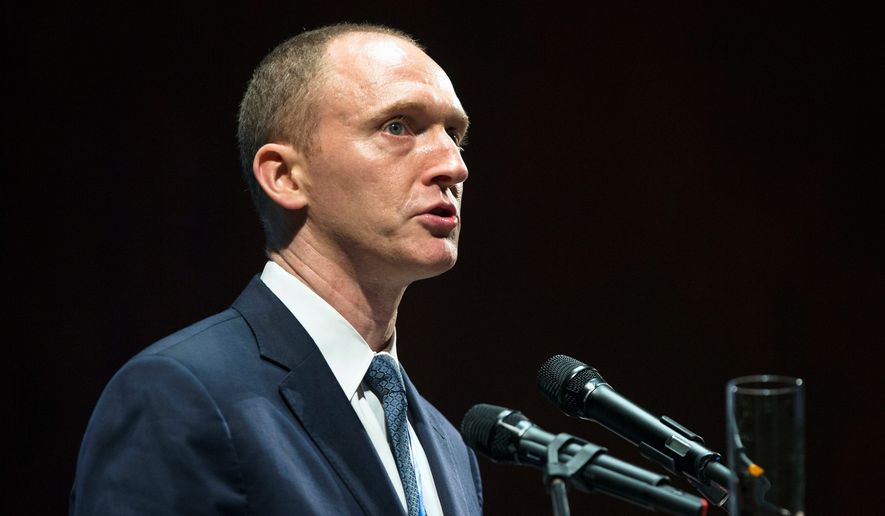Britain’s spy service’s connections to shadowy investigations into Donald Trump have grown stronger with the revelation that academic Stefan Halper was spying on the president’s campaign and doing it on British soil.
Mr. Halper, an American national security scholar whom the U.S. government has awarded contracts for classified projects, spied for the FBI, press reports say. He is a partner in Cambridge Security Initiative, a London consulting firm.
His partner is Sir Richard Dearlove, who directed Britain’s foreign spying operation known as MI6, the country’s CIA, from 1999 to 2004.
Mr. Halper chose British soil to introduce himself in early July 2016 to Trump campaign volunteer Carter Page, who became the target of an FBI wiretap the following October. Mr. Page told The Washington Times that the July meeting was his first of several encounters with Mr. Halper.
Mr. Page had just given a public commencement speech in Moscow and had stopped in London for a security conference that Mr. Halper also attended.
In London, Mr. Halper also engaged another Trump campaign volunteer, George Papadopoulos, according to the Daily Caller, which first reported on Mr. Halper and his outreach this spring.
Intelligence experts say that because Mr. Halper was carrying out a U.S. operation in Britain, Washington likely informed and received the blessing of MI6.
“It seems more and more like an FBI-MI6 ops,” Mr. Page told The Times.
Said Larry Johnson, a former State Department intelligence analysis: “There are still many unanswered questions, but the evidence that now is part of the public record removes any doubt that British and U.S. Intelligence services collaborated in a devious and fabricated scheme to portray the Trump campaign as intent on collaborating with Russia.”
Even before the emergence of Mr. Halper as an FBI asset, the British spy service was connected to a campaign to destroy the Trump candidacy.
This came in the form of Christopher Steele, who ran the Russia desk for MI6 before retiring and opening a private investigation firm.
He was hired in June 2016 with money from the Democratic National Committee and the Hillary Clinton campaign. He told an Obama Justice Department contact he was “desperate” to destroy the Trump candidacy.
He wrote a series of accusatory memos that came to be called the dossier — and he provided the information to the British government.
The dossier accused President Trump and campaign aides of engaging in an “extensive conspiracy” to collude with the Russia’s interference in the 2016 election through computer hacking and social media.
None of the charges have been proven publicly, and Trump people say the dossier is full of falsehoods.
In a London court, where he is being sued for libel, Mr. Steele said he had a “duty” to pass his dossier to the British government and to Sen. John McCain, Arizona Republican.
Mr. Steele, his court filing said, was “under a duty to pass the information in the December memorandum to the senior UK government national security officials and Sen. McCain so that it was known to the United Kingdom and United States governments at a high level by persons with responsibility for national security. These recipients had a corresponding duty or interest to receive it in their capacities as senior representatives of those governments with such responsibilities.”
Mr. Steele’s lawyers told the court that Mr. Steele “provided the December memorandum to a senior UK government national security official acting in his official capacity, on a confidential bases in hard copy form.”
The December memorandum, the last of 17 memos, was a catch-all narrative. It accused the Trump campaign of involvement in the Russian hacking of Democratic Party computers and trying to arrangement payments to cover it up.
All of those charges have been denied, and there is no public independent confirmation.
The London libel case only deals with the December memo, so Mr. Steele was not asked about other memos he may have proved to UK officials. Conventional wisdom says he provided them to MI6, where he worked and maintained contacts.
Mr. Steele accused Mr. Page of meeting with high-level Kremlin figures during his July visit to discuss bribes in exchange for sanctions relief. Mr. Page has testified under oath he never met with those two people or discuss bribes with any Russian.
Mr. Steele also said that former campaign manager Paul Manafort and Mr. Page worked together to coordinate the Russia hacking. Mr. Page testified he has never met Mr. Manafort.
There has been no evidence to rebut that testimony. Special counsel Robert Mueller has told Mr. Manafort’s defense lawyer that he has no evidence of his client talking to Russian officials.
John Dowd, Mr. Trump’s former defense counsel, said the Halper spying “is more than sufficient basis to challenge” the authenticity of Deputy Attorney General Rod Rosenstein’s order to appoint Mr. Mueller in May 2017.
“It was all ruse to divert our attention from this incredible, unlawful usurpation and abuse of police power by the senior leadership of the FBI to penetrate the opposition Trump presidential campaign in 2016,” Mr. Dowd said.
J.D. Gordon, a Trump campaign national security adviser, said: “The more we learn about how James Comey and Andrew McCabe ran the FBI, the more unbelievable it gets. Obama and associates have some explaining to do. DoJ and Congress ought to conduct thorough investigations, and let the evidence follow wherever it leads.”
Mr. Comey and Mr. McCabe ran the FBI during the Trump campaign as director and deputy director, respectively.
• Rowan Scarborough can be reached at rscarborough@washingtontimes.com.




Please read our comment policy before commenting.